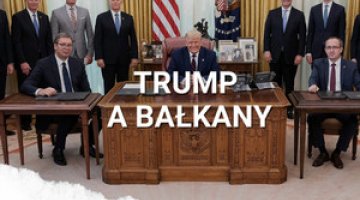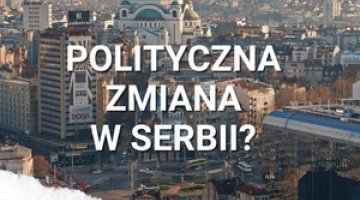A new government in Serbia – a difficult continuation
On 26 October, the Serbian parliament approved the composition of the new government which had again been formed by Ana Brnabić. It took more than six months to form the cabinet after the parliamentary election. This was a fifth election win for the coalition led by the right-wing Serbian Progressive Party (SNS) which has been in power since 2012. It garnered 43% of the vote and 120 seats in the 250-seat parliament. The SNS will again govern the country alongside the pro-Russian Socialist Party of Serbia (SPS). Influential officials representing SNS were placed in charge of the key ministries of force and nominated for positions that give them a great deal of control over the flow of public funds. Siniša Mali will serve as the Minister of Finance, Bratislav Gašić as the Minister of the Interior, Miloš Vučević as the Minister of National Defence, and Goran Vesić as the Minister of Construction, Transport and Infrastructure. Representatives of SPS will head five ministries (there are 25 in total), and the party’s leader, Ivica Dačić, will serve as the Minister of Foreign Affairs.
During the presentation of the new government, Prime Minister Brnabić declared that the government’s main priorities would be to promote economic growth and ensure the country’s energy security. She promised investments worth 12 billion euros in energy and road infrastructure as part of the “Srbija 2025” development plan. At the same time, she pointed out that the main challenges for Serbia in its relations with the EU will be its close cooperation with Russia and the normalisation of relations with Kosovo.
Commentary
- The new government will not make any fundamental changes to Serbia’s current domestic or foreign policy. Belgrade will continue trying to avoid taking a clear stance on the war in Ukraine. It will seek to further deepen its cooperation with China and Turkey, while also declaring its ambition to become a member of the EU. It is unlikely that the reform process will be accelerated, especially in key areas concerning the rule of law or the judiciary, as this would affect the interests of the ruling elites, who are embroiled in numerous corruption scandals. It may even be assumed that the autocratic system will be further strengthened and that there will be an intensification of the restriction of media freedom and the activities of civil society organisations.
- President Aleksandar Vučić will remain the key decision-maker. Although he has very narrow formal competences, his strong position as the leader of the ruling SNS party makes him de facto superior to the prime minister and ministers. This was clearly demonstrated when the main nominees for ministerial positions were announced by the president, not the prime minister. The appointment of the government at the last possible constitutional date contributed to strengthening Vučić’s control over his party and playing the factions inside his party off against each other. Key functions in the new government were entrusted to his loyal aides, which guarantees that they will follow the instructions from the presidential centre when carrying out their official duties. Politicians who had attempted to build their own position were either removed from power or nominated for positions in less significant ministries. Furthermore, some of the new government’s members have no experience, and their position depends entirely on the president. Prolonging the appointment of the government was also used a pretext for postponing important decisions in relations with the West concerning the harmonisation of Serbian foreign policy with the EU (Belgrade has not joined the EU sanctions against Russia) and the normalisation of relations with Kosovo (the EU and the US are pushing for this issue to be resolved as soon as possible). The Serbian government will try to avoid any concessions in both of these areas.
- The composition of the new government, first of all, offers Vučić an opportunity to build a positive image for himself. For this reason, nine ministries and the post of prime minister have been entrusted to women, but their real influence on governing the state will be limited. The nomination of Tanja Miščević as Minister for European Integration is a nod to the European Union. Miščević was previously the chief negotiator in accession talks with the EU. Politicians who unequivocally advocate close cooperation with Moscow did not enter the government. However, SPS, which protects Russian interests in the energy sector, has gained as many as five representatives in the new cabinet. Furthermore, some politicians who had been involved in extremely high-profile corruption scandals have been left out.
- In foreign policy, the government will try to continue to balance its cooperation with the EU and the US with its close cooperation with Russia and China. The government will seek to strengthen its position and influence in the region through the Serbian Open Balkan initiative (for more details, see ‘Inicjatywa Open Balkan – kręta droga ku regionalnemu Mini-Schengen’) and friendly cooperation with those countries which are manoeuvring between East and West, such as Hungary and Turkey. Belgrade hopes that these alliances, as well as Serbia’s strong regional position in the Balkans will ensure that other EU countries do not push too hard for a break or a decisive weakening of relations with Moscow, a normalisation of relations with Prishtina or reforms aimed at strengthening the rule of law.
- The economic situation will be a serious challenge for the new cabinet. The government has announced that it will continue the current model of development based on foreign investments and the development of infrastructure. However, there are increasingly frequent indications that this model is ineffective. So far, foreign investors have primarily been attracted to Serbia primarily by generous state subsidies and cheap labour, and now these resources are beginning to be in short supply. The Serbian public is also increasingly manifesting dissatisfaction with large investments carried out without respect for the environment. In addition, the government in Belgrade has for many years neglected the issues of energy transformation and the diversification of raw material supplies, which in the current crisis means a serious risk to the country’s energy security. The government still keeps the prices of electricity (bought on the European stock exchange) at a very low level, which is a serious burden for the state budget. Although the government has declared it will support innovative sectors of the economy, it seems that they do not have much development potential in Serbia due to unfavourable conditions for doing business (resulting from a poorly functioning justice system and a high level of corruption).




